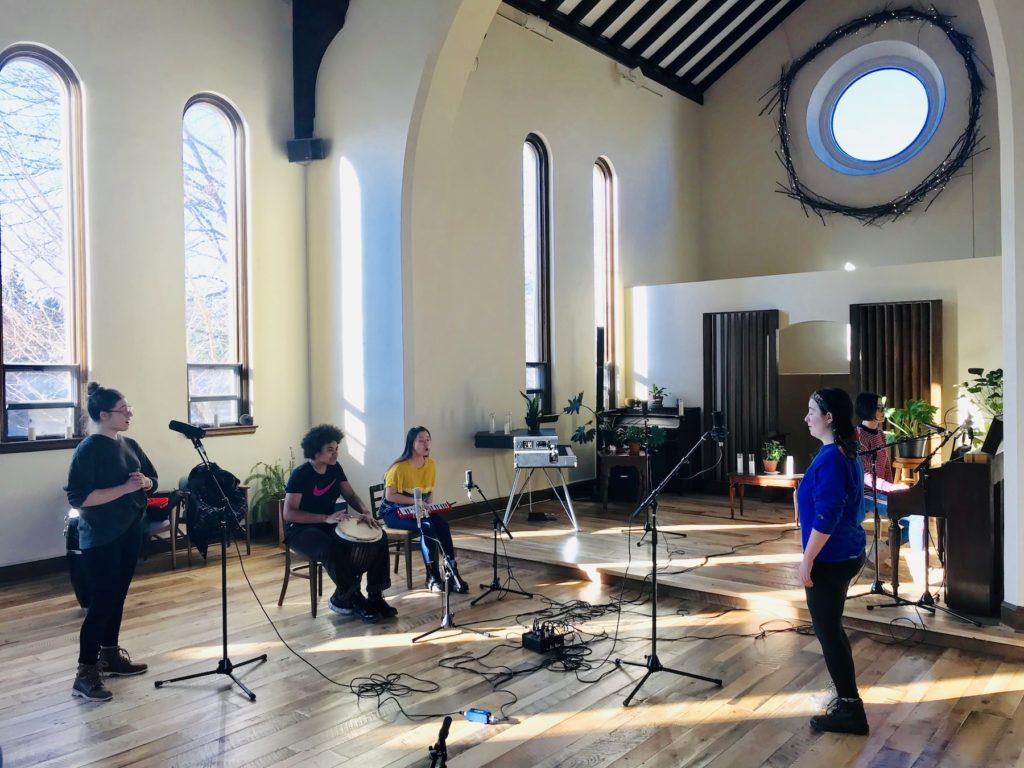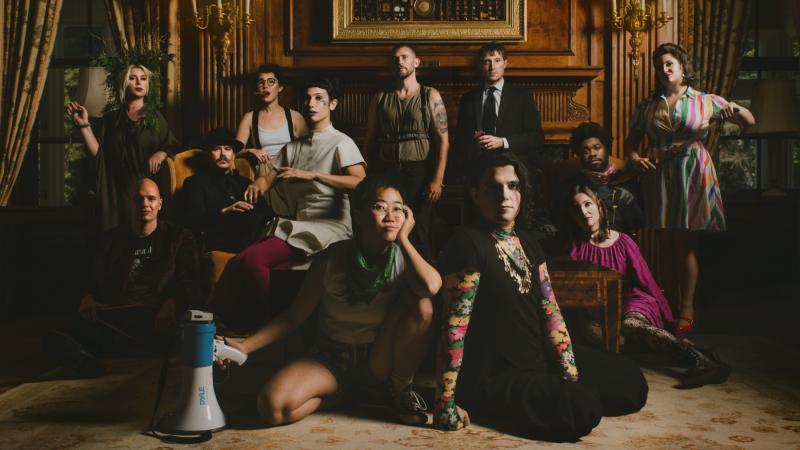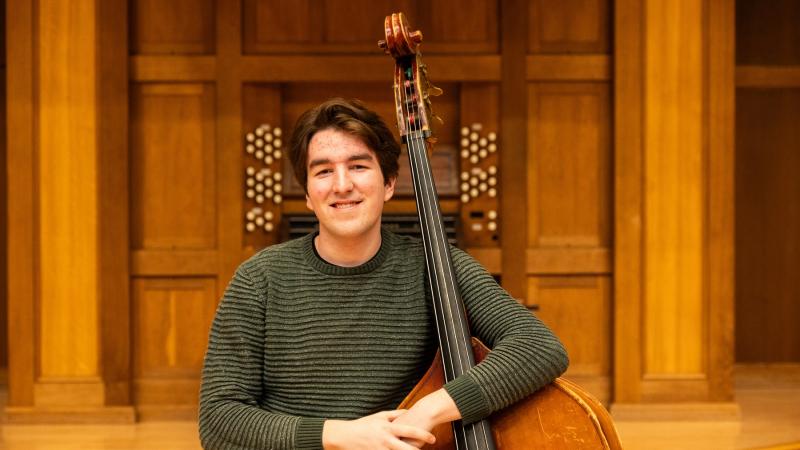Get Cory Chisel talking about American roots music and the floodgates open.
The Grammy-nominated singer-songwriter who is forging new partnerships with Lawrence University — including venturing into the classroom — will tell you about wisdom gained from working alongside genre-defining singers such as Rosanne Cash and Emmylou Harris.
He’ll tell you about learning to look deeply inward, needing to embrace his own journey before the music could come out.
And he’ll tell you about an eclectic collection of family members who influenced his musical psyche from early on, instilling in him a passion for early American roots music from the likes of Willie Dixon and Robert Johnson — survival music, he calls it.
“My uncle took me to a record player and we sat down, and with no explanation whatsoever he made me lay on the floor and let the music come into my body,” the Appleton-raised Chisel said. “Not just into my ears, but vibrationally into my body. He taught me how to receive music as a medicine. I learned about that style of music with my toes and my fingers and my back and my bones.”
If you think that sounds a little like Deep Listening, the practice espoused by and taught via Lawrence’s Conservatory of Music, you’re not wrong. Call it a reflection of the deepening connections between Lawrence, Chisel and his Refuge Foundation for the Arts, a nonprofit artistic haven operated out of a converted monastery just two miles up the road from the Appleton liberal arts college.
When Lawrence’s fall term begins, Chisel will return to the classroom, co-teaching Sound Lab: American Roots Music with Brian Pertl, dean of the conservatory, and Leila Ramagopal Pertl, a class they first launched a year ago. Lawrence students will again have opportunities to create their own music, record at the Refuge, talk with visiting musicians and hear from music industry professionals who periodically make their way to Appleton for sessions with Chisel and his rotating menagerie of artists.
The bonds began nearly seven years ago, when Chisel was co-founding Mile of Music with marketing executive Dave Willems and reached out to Pertl for advice on infusing music education into the all-original music festival. That led to a meeting with Ramagopal Pertl, a music education instructor at Lawrence who would become the music education curator for the annual downtown Appleton festival.
“It was like talking to the soul brother I never had,” Ramagopal Pertl said of those first meetings with Chisel.
Lawrence widens musical path with new B.M.A. degree

Cory Chisel (wearing hat) works with students as part of last fall’s Sound Lab: American Roots Music class. He’ll return to the classroom for fall term in a co-teaching role.
Three years later, Chisel and his partner, Adriel Denae, founded the Refuge Foundation for the Arts and moved into the former Monte Alverno retreat, a monastery overlooking Riverside Cemetery that once served as a sanctuary for the monks of the Capuchin Franciscan Province of St. Joseph Order.
It’s become a gathering place for musicians, some local, some coming in from places across the country and even around the world. They come to record, to find their artistic bearings, often staying for extended stretches of time, sleeping among the dozens of tiny guest rooms that once housed the monks.
For Pertl, the mere existence of the Refuge in Appleton is a gift to the conservatory. That Chisel and Denae share the philosophies of Lawrence and the passions of creative music-making, all the better.
“Our vision and our hope is that this partnership grows, it becomes porous, that what the Refuge can offer can flow into Lawrence and the conservatory, and what the conservatory and Lawrence can offer can flow into the Refuge,” Pertl said.
Classroom connections
What the Refuge can offer became abundantly clear to Pertl as he and Chisel ventured into the Sound Lab class last fall. They asked the 13 students to explore their own musical journeys, the influences that shaped them, and then partner with classmates to create their own roots music.
She Walks Away
Listen to one of the student-created songs
It was a different approach than anything the conservatory has done, but something that might become more familiar with the launch of the new Bachelor of Musical Arts degree that aims to open the doors of the conservatory to a wider breadth of musical interests and styles.
The students in last fall’s class made numerous visits to the Refuge. They met with members of the Lumineers. They met with a record label executive who had signed Chisel to a recording contract more than a decade earlier. They laid down tracks as the songs they crafted in class came to fruition, eight of them later shared in a public performance. Similar experiences are on tap for this fall’s class.

“We are on a parallel path,” Cory Chisel, seen here during a classroom session, says of the Refuge Foundation for the Arts and the Lawrence Conservatory of Music.
Having this resource so readily available provides another layer to the Lawrence education, allowing music students to interact with musicians and music industry people who are navigating the world of music-making in a very real way. They’re not talking about it. They’re doing it.
“The Refuge and all of the connections that it offers into the greater world of commercial music-making gives Lawrence this incredible pathway into learning about the music world that is rare among America’s top conservatories,” Pertl said. “The whole class came over and hung out with the Lumineers. They heard the Head and the Heart in a recording session. They were talking to one of the head execs at RCA Records. When the class came over here, most of them didn’t know this building existed. They were just walking around with their jaws open.”
A project is born
Sam Taylor ’19 was one of those students. The Sound Lab class inspired his Lullaby Project, an effort to work through Lawrence, the Refuge, Harbor House Domestic Abuse Programs and New York’s Carnegie Hall to teach mothers at the Appleton shelter to write lullabies for their children. Carnegie Hall, where Taylor interned this summer, originally began the Lullaby Project with unwed mothers. It now provides guidance for related projects across the country.
Even though he graduated in spring, Taylor will be back in Appleton this fall — splitting his time between here and Madison — to see the project through, working with Chisel and Denae, Lawrence students, and Harbor House staff to bring the lullabies to fruition and get them recorded at the Refuge.
That’s just one slice of the value that came from the Sound Lab class, Taylor said.
“The Roots class came at the perfect time in my Lawrence career,” he said. “I was reflecting a lot on my time as a student, musician, and person. This course not only allowed us but also encouraged us to explore our individual journeys and music. … Who inspired us? Where our sound comes from. It gave me time to place myself on a larger timeline, to find specific moments that have led me to this exact time and space.”
New adventure, a shared vision
For Chisel, the opportunity to teach at Lawrence, to share his passion for roots music, is something he didn’t envision earlier in his life. He doesn’t hide his history of once shunning school. But now he has something that’s drawing him to the classroom, and a receptive audience ready and willing to listen and respond.
“When people found out I was being welcomed to teach at Lawrence University, I had teachers calling me, saying, ‘I have to say, I never saw this one coming,’” Chisel said. “I’d be lying if I said I did. But that’s not really what it’s about. The idea that through effort and maybe this emphasis on approach, which is on the individual and the elevation of the consciousness, that really might be what we’re on to.
“I think when you spend your whole life not wanting to go to class, you get a good idea of what it might look like when there’s a class you want to go to.”

Cory Chisel accepted a collaboration award for Mile of Music from Lawrence University in 2015. The relationship with Lawrence has continued to grow since then.
That elevated consciousness, the looking inward to discover your own musical roots and then pouring that into song, was front and center when Pertl first broached the idea of jointly teaching a class with Chisel on American roots music, in the process emphatically cementing a relationship between Lawrence and the Refuge that had already been quietly blossoming.
“We are on a parallel path,” Chisel said. “That’s been the beauty of this. We’ve bounced off of each other’s ideas, but in certain ways we were really plowing the same field. Eventually, it was, ‘Let’s line this all up and get organized.’”
A new classroom approach
How to co-teach the course was the question that needed a fresh answer.
“This was not going to be a standard musicology class,” Pertl said. “I have taught that class dozens of times at other institutions. Here’s the history of American roots music. I’ve done that. It’s a fine approach. We did not want to do that here at Lawrence. We wanted to blow that paradigm out of the water and say, ‘Why can’t musicology be performative? And why can’t performances be influenced by history?’ That’s about as liberal arts as you can get.”
The class took the students by surprise, Pertl said.
“In a traditional conservatory education, we have brilliant musicians who can play anything,” he said. “But often you are so focused on getting all those notes right to play Chopin or Liszt that you forget that you have a voice, too. You are used to always channeling someone else’s voice. All of a sudden in this class, two or three weeks in, we say, ‘OK, so your assignment is to write about your musical roots. Who are you musically?’
“All of a sudden the class pivots to be about them instead of about dead people. All of a sudden roots isn’t about something that happened in the ’20s, it’s now. All of a sudden they’re reading their roots to each other and it’s like, ‘Oh my god, our roots are similar because our musical roots both came out of church traditions, completely different church traditions.’
“And then the next pivot was, ‘OK, now we’re going to create together, you’re going to use your roots collaboratively to create music.’ And to me that is where the magic of the class really took off.”
The students would go on to create eight original songs together and record them at the Refuge. They then performed those songs for a live audience at The Draw.
“Once the roots music became real to them, and once it became about their story, at that point they could see the way in and see what its use is,” Chisel said. “And then you just get excited. And then we couldn’t keep up.”
A mutual respect
The lessons learned don’t go just one way. While Pertl and Ramagopal Pertl call the Refuge an unbelievably valuable resource, Chisel is quick to praise Lawrence, the intelligence and vibrancy of its students and faculty and its deep history.
“We look at Lawrence with a great deal of respect, just the reverence that we haven’t had around here that really exists within that institution,” Chisel said. “As time goes on, we’re going to remain our own identities, but I think respectfully we at the Refuge are learning how to walk a walk of sustainability and longevity. We really want to be a place like Lawrence. When people say they’re from Appleton, Wisconsin, people are like, ‘Oh yea, Lawrence University.’ We want to be one of those places.”
Pertl paints the connections with the Refuge as a relationship not bound by a contract. It’s fluid, and it dovetails nicely with the conservatory’s efforts to help prepare 21st century students to live their best musical lives, to be a light both in and out of the traditional corridors of the music world.
“We want to hold open possibilities, but we know if we can make this relationship closer and closer and integrate it more and more, it’s going to benefit both institutions in ways that we probably can’t completely imagine,” Pertl said. “We definitely think it’ll benefit the B.M.A. in beautiful ways as more contemporary singers come in and more singer-songwriters come in, more people trending toward that side of the music business. The basis of the B.M.A. is jazz and improvisation, but from that foundation you can go anywhere.
“As a university, if you stagnate, you’re going backwards. If you are treading water, you are going downstream. Unless you’re absolutely thinking about what’s next, you’re probably not going to have long-term viability. And I never say that as if change itself is the thing. You have to pursue thoughtful change and insightful change and forward-thinking change.
“We’re doing this because our partnership will better prepare our students for the world they’re going to be launching into after graduation,” Pertl continued. “And this place, the Refuge, Cory, Adriel, everyone here can help our students better prepare for the unknowns of that world.”




